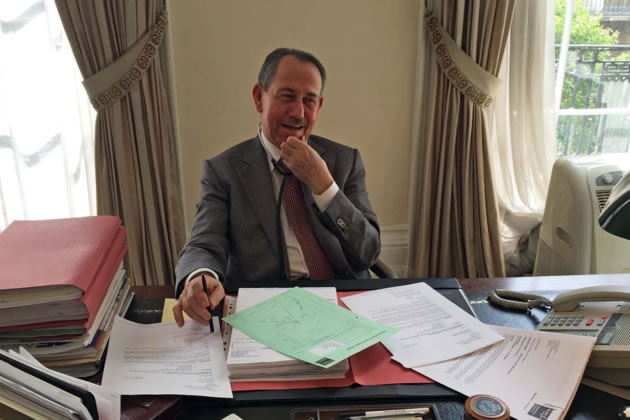Asma al-Assad's Family Believed to Have Fled to Moscow
Quit Acton home to join daughter as Syria celebrates husband's downfall

Asma al-Assad on an earlier visit to Moscow. Picture: Ammar Abd Rabbo
December 11, 2024
The former Twyford CofE School pupil Asma al-Assad has reportedly been joined in Moscow by her parents.
The 54-year-old wife of the deposed Syrian dictator fled with her three children when his regime collapsed and, according to some local reports, her parents were already there to meet her.
Their pebble-dashed semi-detached house just to the north of Western Avenue appears to have been abandoned for at least ten days.
Her father Fawaz Akhras, a Harley Street cardiologist, may have had advance warning of the toppling of their son-in-law’s regime as he left the UK several days in advance of its end. His wife Sahar, a former diplomat, has not been seen in Acton for several years and was believed to be living in Syria.
According to a local shopkeeper quoted on MailOnline, Fawaz Akhras told him at the beginning of this month that he was leaving the country and would be away for some time.
His house had been attacked some years ago when emails were revealed showing he had advised Bashar on how to frame the crackdown on his opponents in the western media. This resulted in Syrian opposition groups throwing paint over his home, pushing over a wall and breaking its windows.
This Monday, the US government named Fawaz Akhras, who has dual Syrian and UK nationality, on a sanctions list. He was being designated for providing “support and facilitation to Bashar al-Assad related to financial matters, sanctions evasion and attempts by Bashar al-Assad to achieve international political engagement”.

Fawaz Akhras in his consulting room
Asma al-Assad, who was known as Emma when she attended school in Acton, had known Bashar al-Assad for many years before she married him in 2000. She had regularly met him during family trips back to Syria.
Having gained a degree in computer science at King’s College London she worked in mergers and acquisitions for Deutsche Banks and JP Morgan before first meeting her future husband in 1992 when he was studying ophthalmology at the Western Eye Hospital in Marylebone.
At the time, it wasn’t anticipated that Bashar would rule Syria. His older brother Bassel was being groomed as the heir to Hafez Assad but he died in a car crash in 1994. When his father died in 2000, Bashar returned to Syria to take over control, marrying Asma six months later with no publicity.
There were high hopes that Bashar’s choice of bride signalled a more inclusive form of government. He was from the Alawite sect that had dominated the country since French colonial rule. She was from the Sunni Muslim community in Homs, many of whom had suffered under Bashar’s father. His choice of bride was controversial with his wider family. She travelled through the country before few of its citizens knew who she was and gave her support to progressive causes. Initially the couple lived in a Damascus apartment rather than the presidential palace and an attempt was made to provide their three children with a normal upbringing.
Her profile quickly grew and the Syrian First Couple were received by heads of state across the world including by the Queen at Buckingham Palace in 2002. Gushing articles in fashion magazines focused on her glamour ignoring the repression and violence that kept her husband in power.
The tone of coverage of Asma al-Assad both domestically and abroad changed after 2011 with her now being portrayed as the Marie Antoinette of Syria. Her husband’s crackdown on his own people after the Arab Spring revolts in 2011 ended with a civil war that is estimated to have resulted in half a million deaths and half the country being displaced.
From this time, she stopped giving public statements or interviews other than to Russian channels but remained at her husband’s side at government rallies and continued to order expensive luxury goods from abroad. It is thought that her influence grew as other senior figures in the government were sidelined or killed.
This led to a travel ban being imposed by the European Union and a freeze on her assets. She was sanctioned by the US for her “ill-gotten gains at the expense of the Syrian people” and misuse of the funds of charities that she controlled.
She does still hold a British passport, but enquiries were opened into her potential incitement of war crimes by the Metropolitan Police in 2021. With evidence emerging by the day of the atrocities committed by the regime, it is unlikely that she would be welcomed back even if international courts fail to convict her of any crimes. The Prime Minister has said it was too early to say whether Asma al-Assad would be stripped of her British citizenship.
It is alleged that the Assad’s have assets of over $2 billion but if they have successfully smuggled that amount out of the country, it is questionable how long Mrs al-Assad will have to spend it. Having been diagnosed with breast cancer in 2018 she more recently developed with acute myeloid leukaemia, an aggressive cancer of the bone marrow and the blood for which treatment continues.
The couple’s three children Hafez, 23, and Karim, 19, and daughter Zein, 21 who, along with their mother, were granted asylum on the personal order of Vladimir Putin. For Hafez, at least, the transition to a new life in Russia may be relatively easy as he studied mathematics at Moscow State University but for the rest of the family the rapid turnaround in fortunes may be difficult to come to terms with given the luxury they were used to in Damascus.
There will be little sympathy for them from the family’s neighbours in Acton, an area which contains a substantial number of Syrians from the diverse communities of that country that have suffered under al-Assad rule.
Ealing Central and Acton MP raised the concerns of Syrians in her constituency in the House of Commons, citing the case of Waheeba whose Christian family, having fled to Aleppo ten years ago, found themselves under threat from both Jihadist terrorists and Russian air strikes. She asked if a Ukrainian style resettlement scheme would be considered.
The minister replied that, with the situation so fluid, policy was still being formulated.
A Home Office spokesman said, "The Home Office has paused decisions on Syrian asylum claims whilst we assess the current situation.
"We keep all country guidance relating to asylum claims under constant review so we can respond to emerging issues."
For now, there is a mixture of great hope and great fear from people from Syria, including those living locally, about the future of their country.
Value Reading Articles Like This? Help Us Produce More This site remains committed to providing local community news and public interest journalism. Articles such as the one above are integral to what we do. We aim to feature as much as possible on local societies, charities based in the area, fundraising efforts by residents, community-based initiatives and even helping people find missing pets. We've always done that and won't be changing, in fact we'd like to do more. However, the readership that these stories generates is often below that needed to cover the cost of producing them. Our financial resources are limited and the local media environment is intensely competitive so there is a constraint on what we can do. We are therefore asking our readers to consider offering financial support to these efforts. Any money given will help support community and public interest news and the expansion of our coverage in this area. A suggested monthly payment is £8 but we would be grateful for any amount for instance if you think this site offers the equivalent value of a subscription to a daily printed newspaper you may wish to consider £20 per month. If neither of these amounts is suitable for you then contact info@neighbournet.com and we can set up an alternative. All payments are made through a secure web site. One-off donations are also appreciated. Choose The Amount You Wish To Contribute. If you do support us in this way we'd be interested to hear what kind of articles you would like to see more of on the site – send your suggestions to the editor. For businesses we offer the chance to be a corporate sponsor of community content on the site. For £30 plus VAT per month you will be the designated sponsor of at least one article a month with your logo appearing if supplied. If there is a specific community group or initiative you'd like to support we can make sure your sponsorship is featured on related content for a one off payment of £50 plus VAT. All payments are made through a secure web site. |